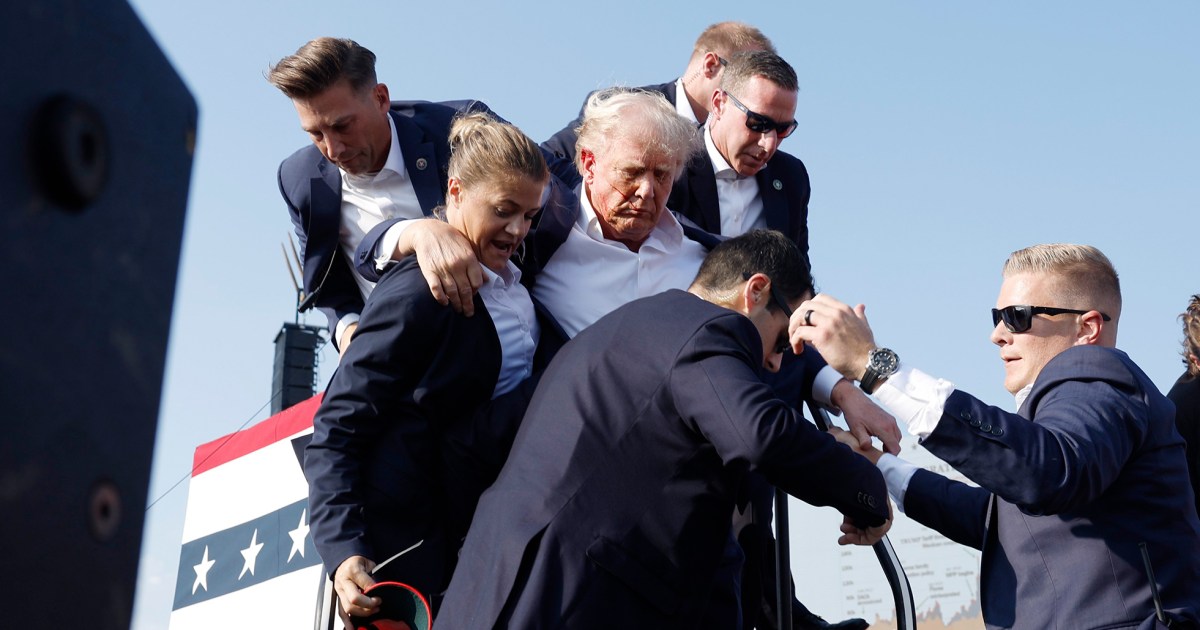WASHINGTON — The Secret Service made a series of “foreseeable” and “preventable” mistakes in the lead-up to the first attempt to assassinate Donald Trump in July that allowed a gunman to fire shots that killed a Trump rally attendee and grazed the Republican presidential nominee’s ear, senators in both parties charge.
The Senate Homeland Security Committee and its Permanent Subcommittee on Investigations said in a joint interim report in their investigation of the Butler, Pennsylvania, shooting Wednesday that responsibilities weren’t clearly defined ahead of the July 13 rally and that personnel they interviewed who were responsible for planning have “deflected blame.”
While the Secret Service has acknowledged “ultimate responsibility” for the failure to prevent Trump’s being struck by a bullet, the report says key Secret Service personnel “declined to acknowledge individual areas of responsibility for planning or security as having contributed to the failure to prevent the shooting that day.”
The report also highlights the types of technological issues that are common within massive federal bureaucracies like the Secret Service.
Among the errors identified by the report: The Secret Service knew that snipers with local law enforcement planned to set up inside the building where the shooter ultimately fired from, rather than on the roof. Communications were siloed, and the Secret Service “did not ensure it could share information with local law enforcement partners in real time,” the report says.
Another example in the report: After a sniper with local law enforcement texted the leader of the Secret Service counter-sniper team about the man who would soon fire shots at Trump, it took seven minutes for the Secret Service leader to send an email relaying the information and photos. It’s unclear how long it then took the other members of the Secret Service sniper team to read the email — titled “Local CS BOLO,” meaning “be on the lookout” — and a counter-sniper team member said the email was “worded vaguely.”
The report also noted that other components within the Secret Service rejected requests from Trump’s detail, including a request for counter-assault team liaisons to coordinate tactical teams that day.
The Secret Service released its own internal report last week.
Sen. Richard Blumenthal, D-Conn., who chairs the investigations subcommittee, said the Secret Service engaged in an “Abbott and Costello kind of ‘Who’s on First?’ finger-pointing in the aftermath” of the attack.
Blumenthal stressed that the report is interim and said there are a lot of unanswered questions, adding that the Department of Homeland Security had been “less forthcoming” than the American people need and deserve.
“If I had to point to one solution here … chain of command would be at the very top of the list,” Blumenthal said.
“I think that we ought to be aghast and astonished at the kind of loosey-goosey walk-through on the site, the failure to share intelligence,” he said. “What happened here was really an accumulation of errors that produced a perfect storm of stunning failure. In a sense, a lot of these individual failings, if corrected at the time, might have prevented this tragedy. And, clearly, it was a tragedy. A man died, a former president was almost killed, and it was completely preventable from the outset.”
Senate Homeland Security Committee Chairman Gary Peters, D-Mich., noted the “interim” nature of the report as evidence that the investigation continues.
“Our report was bipartisan, as well,” Peters told NBC News. “So we take the politics out of it, just look at the facts, and the more facts we put out, people will have a better idea of what actually happened.”
Peters stressed that it was “absolutely important to get facts out as quickly as possible, because conspiracy theories will always arise whenever there’s a void of information.”
Sen. Ron Johnson, R-Wis., a Trump supporter who previously suggested that the Jan. 6 riot was largely a “peaceful protest” aside from some “agitators,” has also suggested without evidence that the government could have played a role in the shooting. He argued Tuesday that the Secret Service was “stonewalling” the congressional investigation.
“They are slow-walking this investigation. I think that this committee needs to start issuing subpoenas,” said Johnson, the top Republican on the investigations subcommittee. “This is a management problem, plain and simple. You can keep throwing money at it, but unless you fix the management problem, you’re not going to fix the problem.”
The report also noted the Secret Service bureaucracy and its struggles with technological innovation and efficient communications.
The agency used a Counter Unmanned Aircraft System in Butler to try to deal with unmanned drones — like the one Trump’s attempted assassin used that day — but the advance agent operating the device immediately had issues with it, according to the report. The agent then moved the device away from satellite trucks that were at the rally but still had issues. Even after an 888 tech support hotline run by the manufacturer was called, the system wasn’t working, according to the report.
Eventually, someone from the tech support unit said components of the system weren’t communicating, and the agent borrowed an Ethernet cable from the Trump campaign personnel in charge of audio-visual productions and finally got the system to work at 4:33 p.m., according to the report.
The only problem, according to the report, was that Trump’s attempted assassin had stopped flying his drone about a half-hour earlier, taking an 11-minute flight starting at 3:51 p.m.

